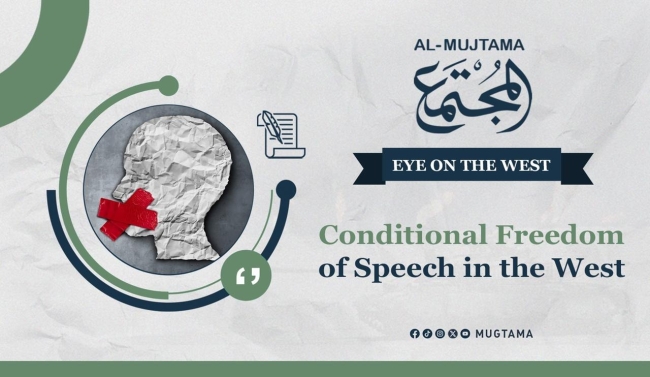Over the past years, the "cloak of democracy" worn by the West has begun to fall, revealing the falsehood of freedom of speech and expression that they boast about, which ends when it threatens their interests. People are now forced to think before sharing their opinions or objecting to anything, and they are compelled to accept what neither reason nor religion can tolerate. With significant transformations in Western societies regarding values and social norms—especially concerning issues of identity, social justice, and discrimination—the fear of expressing opinions has increased due to the abundance of negative reactions, attacks, and accusations aimed at those who oppose these ideas and norms.
To avoid repeating their racist history, Western societies have adopted extreme policies of diversity and inclusion to the point where criticizing pro-minority positions now risks being labeled as racism or discrimination.
Cancel Culture and Social Media
With the rise in negative reactions, the “cancel culture" has emerged, targeting public figures and even ordinary individuals for their opinions. This can sometimes lead to people being deprived of job opportunities or having their personal lives threatened. A well-known example is the case of author J.K. Rowling, who faced severe backlash after expressing opinions about gender identity that some viewed as opposing "transgender rights." This led to campaigns to "cancel" her, with some people boycotting her books and thousands attacking her on social media.
Cultural Shifts in Acceptance and Norms
Issues like gender identity and sexual orientation have become more prominent in the West, with societal expectations increasingly leaning towards supportive stances. Many now advocate for the necessity of using the chosen pronouns of transgender individuals—such as "he," "she," or even "they." Failure to comply with these norms is often regarded as unwelcome behavior or even "transphobic."
Some schools in the West have also introduced curricula that educate children about gender identity from a young age, sparking mixed reactions. While some view this as essential education, others—particularly from religious backgrounds—argue that these policies conflict with their values and impose discussions on sexual matters at an early age.
The Politicization of Free Speech
The West's stance on free speech is marked by contradictions. For example, questioning the Holocaust is a criminal offense in many Western countries. Those who deny the Holocaust or challenge the reported death toll are not only censored but sometimes imprisoned, preventing historians and thinkers from researching the matter thoroughly with evidence. Some writers and intellectuals remain imprisoned in these countries due to their stance on the Holocaust or their belief that the number of Jewish victims has been exaggerated.
If you reject mainstream opinions or are not part of the community in question, your views are often dismissed as "hostile" or "intolerant." On the other hand, when someone from within the LGBTQ+ community speaks about practices within their community, their voice is taken more seriously. This double standard makes it challenging for outsiders to express their opinions freely.
The West's lack of consistent ethical, social, and political standards has led to this hypocrisy. Those who adhere to traditional religious or social norms are often labeled as intolerant or uncivilized. As a result, society has started to abandon these standards to align with dominant trends, avoiding rejection or criticism from others.
Double Standards in Religious Freedom
Although religious freedom is considered a fundamental right, the West approaches it inconsistently, particularly when religious practices conflict with the prevailing culture. A prominent example is the issue of the hijab in France, where Muslims face pressure from authorities to comply with the country’s secular laws. Despite the principle of freedom of expression, Muslims are restricted in practicing their faith, with bans on the hijab in schools, universities, and even participation in the Olympic Games.
Islam and Freedom of Speech
Understanding the purpose of human existence reveals that actions, speech, and opinions must align with Allah’s will and pleasure. We were created to worship Allah alone, without associating partners with Him, and to submit to His commands. Allah says: "And I did not create the jinn and mankind except to worship Me. I do not want from them any provision, nor do I want them to feed Me. Indeed, it is Allah who is the [continual] Provider, the firm possessor of strength." (Adh-Dhariyat: 56-58), and He also says: "Then did you think that We created you uselessly and that to Us you would not be returned? So exalted is Allah, the Sovereign, the Truth; there is no deity except Him, Lord of the Noble Throne." (Al-Mu’minun: 115-116)
Those who believe they are servants of Allah must adhere to what He commands and refrain from what He prohibits. This contradicts the notion of unrestricted freedom of speech, which promotes saying, doing and worshipping whatever one desires without accountability. Freedom of expression in Islam is not absolute but is governed by the standards set by Allah.
Islam does not prevent people from expressing their opinions on political, economic, or social matters, nor does it prohibit the criticism of mistakes or advising those who err. However, such expressions must adhere to the conditions and etiquette prescribed by Islamic teachings.
-------------------------------------------------------------
Sources:
- "The West: Between the Illusion of Democracy and the Falsehood of Freedom of Expression" – Islamic University Darul Uloom Deoband, India
- J.K. Rowling Controversy – BBC
- Introducing Children to Gender Identity Concepts – The Guardian


